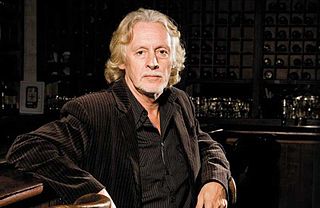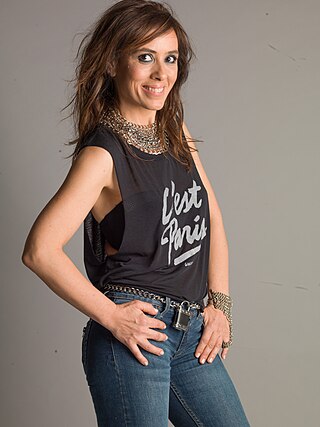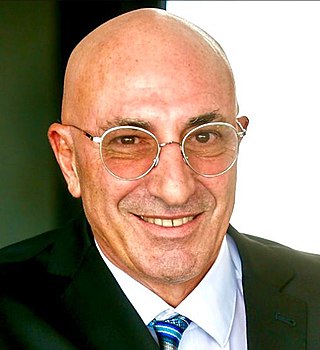This article contains content that is written like an advertisement .(January 2010) |

Carlos De Antonis is an Argentine opera singer. Antonis appeared on Season 12 of America's Got Talent.
This article contains content that is written like an advertisement .(January 2010) |

Carlos De Antonis is an Argentine opera singer. Antonis appeared on Season 12 of America's Got Talent.
Carlos De Antonis was born in Tandil, Buenos Aires province, Argentina. He began studying music in Tandil at an early age with Andres Risso, Bernardo Moroder, and Sofia Galicia. He then moved to Buenos Aires City and completed his studies with Oscar Ruiz and Natalia Biffis. [1]
De Antonis joined the chorus of several important theaters in South America in the early nineties: Teatro Colón in Buenos Aires, Teatro Argentino in La Plata, and Teatro Avenida in Buenos Aires. At the same period he debuted in the musical Dracula, which in 1994 went on a tour and became well known in much of Latin America (Chile, Brazil, Uruguay, Paraguay, and Argentina). In 1993 he played a leading role in the first international version of The Hunchback of Notre-Dame , which was shown at the Luna Park Stadium in Buenos Aires. In 1995 he again played Quasimodo in the Argentine version of the same musical by Cibrian-Mahler. The following year he debuted in the leading part in the musical La Fiesta del Año in Uruguay. In 1997 he starred in Sueños by José Cibrian Campoy and La Mitad de Algo by Enrique Morales. In 1998 he starred in The Zarzuela by Luisa Fernanda. At the same time he toured Argentina and carried out more than 150 performances of his own conception. [1]

In 2000, he moved to Germany where he was selected as a tenor for the Concert Forum Berlin. He performed in opera houses across 43 cities in Germany (including Hamburg, Frankfurt, Berlin, Cologne, Düsseldorf, Munich). He also performed as a tenor in the closing of World Class Polo 2000 and the Grand Ball in Berlin (Adlon Hotel). In 2001, with the Dutch company Concert Music, he performed in the Netherlands, Germany, and Belgium in Drei Jungen Tenoren. In 2002 he worked with the Micheal Tietz Company and toured all over Germany in the Enrico Caruso Gala and with the Music Concert Company in ‘O Sole Mio during the festival of Der Tenore. In the summer of the same year he started performing his one-man Carlos De Antonis Concert in Sardinia, Italy. [1] In 2003, he performed for the first time in the musical Sogno d'Oriente and in the show Gala Lirica. He also performed numerous concerts in Germany, France, Italy, Spain, and Mexico. In 2004,with Gala Lirica and other concert companies he toured Argentina, Uruguay, Chile, and Miami.
In 2005, after playing Alfredo in La Traviata with four performances in La Plata, he played the Duke of Mantua in Rigoletto, followed by Fenton in Falstaff, and Elisir d'Amore in Germany. [1]
In 2006, he debuted at the G. Verdi Conservatory in Milan and played the roles of Count Almaviva in the Barber of Seville, Rinuccio in Gianni Schicchi, Alfredo in La Traviata, and Rodolfo in La Bohème.
He performed other concerts and recitals in Germany, Barcelona, Uruguay, Sardinia, Argentina, Canada, South Africa, Italy and Denmark. He also did new production with the company Giovane Balletto Italiano directed by Matteo Bittante. In March 2006, he performed at the Teatro Rossetti in Trieste in the show Pomeriggi Musicali al Rossetti, organized by Associazione Internazionale Dell'Operetta Friuli Venezia Giulia.
In April, in Barcelona he played Edgardo in Lucia di Lammermoor with Natasha Tupin and Fernando Alvarez while Andrea Alvarez is the conductor. [1]
The end of 2006 marked the beginning of De Antonis’ representation by SPS Records in Los Angeles, California. [2]
In early 2007, he began recording his debut album Del Cuore with the help of producer, Kim Scharnberg. The album was recorded at Capitol Records in Los Angeles and Glendwood Place Studios in Burbank both in California.
On March 24, 2007, De Antonis performed at Celebrity Fight Night XIII in Phoenix, AZ. [3]
De Antonis' debut solo album was titled Del Cuore, which means "from the heart" in Italian. [4]
Del Cuore's eleven songs represent a variety of musical genres including opera, pop, tango, and hymnal. In addition to the assortment of musical styles, the album is also sung in multiple languages including Spanish, Italian, English, Napoletan and Latin. The track list of songs with language and style are as follows: [1]
1. "O Sole Mio" 2. "Todo Me Recuerda a Ti" 3. "This is the Moment" 4. "Nostalgias" 5. "Nessun Dorma" 6. "Two Different Worlds" 7. "Panis Angelicus" 8. "Non Ti Scordar Di Me" 9. "Io Penso a Te" 10. "Mattinata/Oh What a Beautiful Morning" 11. "One Rose"

Track 6 on the album is a duet titled "Two Different Worlds" which De Antonis performs with the Broadway performer and recording artist Linda Eder. [1]
The album was recorded at two separate recording studios. Parts of Del Cuore, including the forty-six-piece orchestra and 30-person choir, were recorded at Capitol Studios in Los Angeles, California. The remainder of the album was recorded at Glenwood Place Studios in Burbank, CA. [1]



Astor Pantaleón Piazzolla was an Argentine tango composer, bandoneon player, and arranger. His works revolutionized the traditional tango into a new style termed nuevo tango, incorporating elements from jazz and classical music. A virtuoso bandoneonist, he regularly performed his own compositions with a variety of ensembles. In 1992, American music critic Stephen Holden described Piazzolla as "the world's foremost composer of Tango music".

The Teatro Colón is a historic opera house in Buenos Aires, Argentina. It is considered one of the ten best opera houses in the world by National Geographic. According to a survey carried out by the acoustics expert Leo Beranek among leading international opera and orchestra directors, the Teatro Colón has the room with the best acoustics for opera and the second best for concerts in the world.

Carlos Alberto GarcíaMoreno, better known by his stage name Charly García, is an Argentine singer-songwriter, multi-instrumentalist, composer and record producer, considered one of the most important and avant-garde figures of Argentine and Latin American music. Named "the father of rock nacional", García is widely acclaimed for his recording work, both in his multiple groups and as a soloist, for the complexity of his music compositions, covering genres like folk rock, progressive rock, symphonic rock, jazz, new wave, pop rock, funk rock, and synth-pop. His lyrics are known for being transgressive and critical towards modern Argentine society, especially during the era of the military dictatorship, and for his rebellious and extravagant personality, which has drawn significant media attention over the years.
Patricio Rey y sus Redonditos de Ricota, also known simply as Patricio Rey, Los Redondos or Los Redonditos de Ricota, was a rock band formed in La Plata, Argentina. The group was active from the mid 70s up to the early 2000s. They are known for shaping Argentine rock and their enormous fan base.

María Cristina Lancelotti, better known by her stage name Valeria Lynch, is an Argentine singer and actress.

Raúl Alberto Antonio Gieco, better known as León Gieco is an Argentine folk rock performer, composer and interpreter. He is known for mixing popular folkloric genres with Argentine rock, and lyrics with social and political connotations. This has led to him being called "The Argentine Bob Dylan".

Carlos Moscardini is an Argentine composer and guitarist. He is professor of guitar at the Gilardo Gilardi Conservatory of Music and Manuel de Falla Conservatory of Music in Buenos Aires.

Soledad "La Sole" Pastorutti is an Argentine folk singer, who brought the genre to the younger generations at the end of the 20th century, and the beginning of the 21st.

Soda Stereo was an Argentine rock band formed in Buenos Aires in 1982. The band's membership consisted of singer-guitarist Gustavo Cerati, bassist Zeta Bosio and drummer Charly Alberti. During their career, the band released seven studio albums before disbanding in 1997.

Laura Ana "Tita" Merello was an Argentine film actress, tango dancer and singer of the Golden Age of Argentine Cinema (1940–1960). In her six decades in Argentine entertainment, at the time of her death, she had filmed over thirty movies, premiered twenty plays, had nine television appearances, completed three radio series and had had countless appearances in print media. She was one of the singers who emerged in the 1920s along with Azucena Maizani, Libertad Lamarque, Ada Falcón, and Rosita Quiroga, who created the female voices of tango. She was primarily remembered for the songs "Se dice de mí" and "La milonga y yo".

Carlos Alberto Mestre mostly known by his stage name Nito Mestre, is an Argentine musician, founding member –along with Charly García– of Sui Generis, member of PorSuiGieco, bandleader of Nito Mestre y los Desconocidos de Siempre and a recording solo artist. Sui Generis, was initially formed in 1969 by Charly García, Nito Mestre, Rolando Fortich (bass guitar Liam Young, Alberto Rodriguez and Carlos Piegari. Later on, Sui Generis became a duo as everyone left except for García. After the band split in 1975, Nito Mestre formed a new band called "Nito Mestre y los Desconocidos de Siempre" with María Rosa Yorio on vocals, Rodolfo Gorosito on guitar, Alfredo Toth on bass, Ciro Fogliatta on keyboards and Juan Carlos "Mono" Fontana as a drummer. In the early 80s, Nito pursued a solo career.
Teen Angels was an Argentine pop band formed from the TV series Casi Ángeles. Its original members were Lali Espósito, Peter Lanzani, Nicolás Riera, Gastón Dalmau and China Suárez, who would be replaced in 2011 by Rochi Igarzábal.
Orquesta El Arranque is an Argentine tango orchestra formed in Buenos Aires in 1996.

Xavier Moyano is an Argentine musician; producer, performer, composer, and educator. He began his career as a session guitarist in Tucuman in 1999. By 2003 was the guitarist for rock/pop band "AVe Cesar" until 2008, after that he became a solo rock instrumentalist. Between 2009 and 2011 he was guitarist and composer of metal band "Seliger" (Argentina/Brasil), between 2014 and 2019 he was guitarist and producer of "Cossas Novas", since 2018 he is guitarist and co-producer of "Rock Bro's" (ClassicRock). He is currently a solo guitarist, session musician and producer.

Deny was an Argentine post-hardcore band based in Buenos Aires.

María Ruanova was an Argentine dancer, choreographer, teacher and ballet master, known for her performances at the Teatro Colón and internationally. She is considered the first Argentina-grown ballet dancer to gain international fame.

Gabriela Edith Pochinki is a singer of Opera and popular music. She was born in Buenos Aires, Argentina, and has begun her career when she was a child. She has been awarded prizes at major Opera competitions, including "Best Female Opera Singer" at the Sanremo Festival and "Best Singer In The World" at the 3º Festival della Lirica of the Sanremo Musica Festival, both in Italy. She got the second prize at the Pavarotti Competition, where she met Luciano Pavarotti, who had said about her: "The quality of Gabriela’s voice is stunningly beautiful".

Alfredo Rossi was an Italian pianist who specialized in chamber music and was notably famous at his time as accompanist to solo artists.

Daniel Doura is an Argentine composer of classical music. Considered one of the Argentine composers who currently have international exposure, Doura is a graduate of the Boston Conservatory, the Massachusetts Institute of Technology and the University of Columbia, and among his teachers were John Cage, Mario Davidovsky, Chou Wen-chung, Alberto Ginastera, Luciano Berio, Tōru Takemitsu, Milton Babbitt and John Adams, among others. He received the Best Composition award from the American Society of Composers, Authors and Publishers (ASCAP) in 1985 and was a finalist for the Best Composition award from the American Academy of Arts and Sciences (AAA&S).